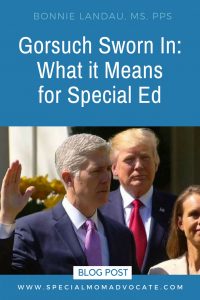 The swearing in of Judge Neil Gorsuch means the Supreme Court now has a conservative bias, and they have added a judge who has a history of ruling against people with disabilities.
The swearing in of Judge Neil Gorsuch means the Supreme Court now has a conservative bias, and they have added a judge who has a history of ruling against people with disabilities.
Special education law is spelled out in the IDEA and Section 504 of the Americans with Disabilities Act, but these are not the only resources for gaining traction. Case law is equally as important when it comes to making sure schools are doing right by a student. Case law is made when a judge makes a decision based on a specific situation. When arguing a case in court, lawyers will cite case law as precedent for decisions. In IEP and 504 meetings we can also cite case law if the school needs convincing on why they need to provide a particular service.
A great example of case law is the recent Supreme Court decision on Endrew F. v. Douglas County School District where they ruled in favor of the plaintiff, a boy with autism named Luke. They found the school had not done everything they should have to provide an appropriately ‘ambitious’ education to the student. This ruling tells school districts that they cannot just let students slide, they have to strive to maximize potential just as they would for a non-special ed student.
The really interesting thing about this case is that it overturned an earlier ruling by Judge Neil Gorsuch. Yes, you heard that right, just weeks before getting sworn in as a Supreme Court justice, the Supreme Court ruled against his decision on the same case. When Judge Gorsuch made his ruling in 2008, he had actually overturned rulings of 3 lower courts, arguing that students like Luke did not need “merely more than de minimis” from the education system. In other words, the student did not need to make reasonable progress. A little bit was more than enough.
The Progressive created a list of some of Judge Gorsuch’s more egregious rulings against individual with disabilities. On a consistent basis he twists the law in interesting ways to side with the bureaucracy, often blaming students for the treatment they received from the schools. The National Education Association (NEA) conducted a review of Gorsuch’s previous rulings. NEA President Lily spoke to Scoop about the review and said, “Gorsuch has gone out of his way to impose extra legal barriers for students with disabilities rather than helping them to overcome obstacles.”
So what does this mean for special education?
Federal law is the measure by which school districts implement their special education programs. While inexact and broad, case law helps to refine the law so schools have a clearer picture of their objectives. With Gorsuch on the Supreme Court we may begin to see a diminishing of rights of special education students with an emphasis on the minimum a school must do to help a student succeed. There is no clear cut answer, but we should all keep our eye on Supreme Court decisions since they may impact how we advocate for services for our children.
Photo credit: President Donald Trump watches as Supreme Court Justice Anthony Kennedy administers the judicial oath to Judge Neil Gorsuch during a re-enactment in the Rose Garden of the White House White House in Washington, Monday, April 10, 2017. Holding the bible is Gorsuch’s wife Marie Louise Gorsuch. (AP Photo/Evan Vucci)
ABOUT THE AUTHOR:
Bonnie Landau is a professional counselor and holistic therapist in Ventura County, California. Her specialities include therapy for autism, therapy for ADHD, and therapy for parenting who have kids with autism or ADHD or other neurodivergence. She changed careers from graphic design to counseling with the goal of helping struggling parents of kids with ADHD, autism, or other neurodivergence find strategies and solutions to help their children succeed. Bonnie is also the author of Special Ed Mom Survival Guide: How to Prevail in the Special Education Process and Find Life-long Strategies for You and Your Child.


